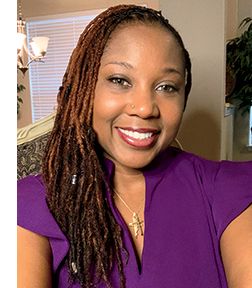NIA MOSTACERO
One afternoon, Nia found her TV remote in her refrigerator.

A few years ago, that would have sent the 46-year-old retired Air Force officer down a rabbit hole of fear. Was her early-stage dementia progressing? Her mind slipping away?
Instead, Nia switched on her favorite show. “I don’t sweat the small stuff anymore,” she says. “When you have Alzheimer’s, every day is a blessing. The future? That’s in God’s hands.”
Between volunteering at church, working out, reading her Bible and attending the young adult early-onset support group she founded, there’s not much time for relaxing. “You can still feel fulfilled with a dementia diagnosis,” Nia says. “Your life isn’t over.”
Her attitude wasn’t always so sunny. Twenty years into her Air Force career, she found herself making errors in her work. She put them off as stress. Then came the day she couldn’t remember how to start her car. The diagnosis, in 2017, was devastating. Her doctor gave her five to eight years to live.
Her military career over, Nia sank into a deep depression. Stopped going to church. But ultimately she realized she couldn’t face this enemy alone. She went back to church. Began talking to God all the time, rather than praying at set times. Through the Alzheimer’s Association, Nia found a support group, then started her own for people who are 65 and younger.
She finds strength in Ecclesiastes 4:9–10, with its ending message: “Pity anyone who falls and has no one to help them up.” Words Nia lives by.
“I feel like God is not allowing me to progress as quickly,” she says, “so I can help others.”
ROD STEPHENSON
Rod realized his dream of becoming a minister late in life. He loved ministering to his parishioners, preparing sermons, immersing himself in Bible study. But it’s now, at 75 and facing early-stage dementia, that he feels closest to God.

“God is in control. I know that more deeply than ever,” he says. “This isn’t my problem to solve, and yet I’m able to talk to the One who has all the answers. That gives me such comfort.”
Rod was diagnosed with mild cognitive impairment in 2020. He had already left the ministry because of health problems. He and his wife, Deb, were caring for his mother, who was in the late stages of Alzheimer’s. No one had to tell them the toll the disease would take. “It was hard to think about anything but how this will end for me,” he says. “Deb cried every day.”
The couple called the Alzheimer’s Association 24/7 Helpline. “That was the best thing we could have done,” Rod says. “It connected us with other people who are on this journey.”
He and Deb began praying together, a practice that has strengthened their marriage. “I’ve learned how important it is to be open with your spouse,” he says. “It has created a deeper bond between us.”
Still, there are times when Rod battles negative thoughts. On those days, he turns to Scripture—Romans 8:38–39: “For I am convinced that neither death nor life…nor anything else in all creation will be able to separate us from the love of God that is in Christ Jesus our Lord.”
“I’m reminded that every day is a blessing,” Rod says. “Alzheimer’s can’t take that away from me.”
For more inspiring stories, subscribe to Guideposts magazine.






